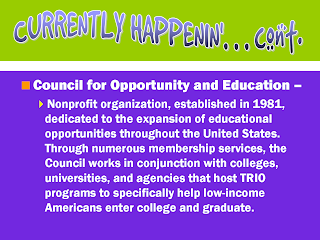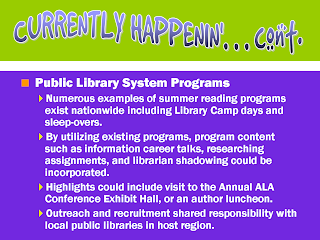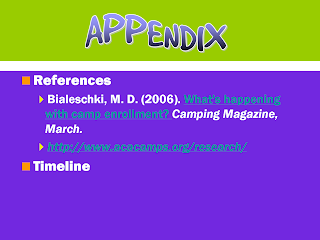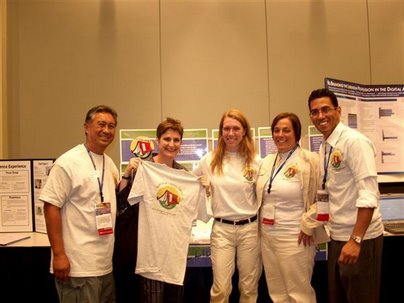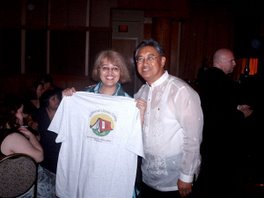National Library Camp Feasibility Study
- Introduction
- Description of project - various camp scenarios - comparisons of several similar career camps
- Demand analysis - complete industry analysis, market potential and projections (general statistical data on camps and camp attendance, age levels, day vs. boarding, etc. and we can correlate the camp data with general census data for projection amounts)
- Technical/organizational analysis - this part includes the place issues, staff information, and time/schedule
- Financial - comparisons with other camps, locations of possible funding sources, tuition and basic camp costs go here
- Conclusion and recommendation
- Appendix - includes timeline of important dates, list of references, etc.
Introduction
There is a pressing need to fill the ranks of America’s Librarians and other Information Professionals (i.e. archivists, museum curators, etc.). As has been discussed at many meetings, diversity of the profession is a major goal as is attracting the youth of America. The concept of a National Library Camp is a welcome project who’s time has finally come. As we embark into the social networking and information sharing of WEB 2.0, young people have become more and more internet, communications, and technology savy. As information professionals we should be on the cutting edge as well as firmly rooted in traditional librarianship.
A National Library Camp geared towards middle school and/or high school aged youth could be a nurturing and mentoring space for the next generation of Information Professionals. It can be a place for students to find the thrill and challenge of research pursuit and the satisfaction of serving others in completing their information seeking tasks and goals. Technology and established library theory can go hand in hand as we exchange ideas of information needs and solutions among professionals and students.
Camp Scenarios
Academic camps can serve as a model as well as provide an existing framework to insert a “Library/ Informational Profession” module. This module could be intergrated into existing sessions of Library Research, or inclusion of information professionals as speakers on Career Panel presentations. Small groups could shadow a librarian for a day/week to observe first hand what the career entails.
Program Proposal – College / University Collaboration
Universities throughout the country have established programs to identify and work with students, usually jr. high - high school students. The main goal of these programs are to get students into college. Many students may be at-risk and coming from economically, environmentally (geographically), and educationally (1st generation college students) populations; or as I like to call them, "the three e's." Programs, such as Upward Bound, Trio Program, and Early Identification Programs are already working with students to help them to think and get into college. In my opinion, the American Library Association should work with these already established programs to incorporate research skills, information literacy/fluency skills, and technology skills that ARE CURRENTLY ABSENT from many of these programs. Many of the existing programs are aware of this absence in their programs of these important learning skills. Therefore, one of my suggestions would be to partner up with one of these already existing programs.
Upward Bound - Approximately 850 federally mandated programs throughout the U.S. in both urban and rural areas. There is a summer program component which would allow the American Library Association to create a library and information component to the already existing program.
Trio Programs - Unlike Upward Bound, Trio Programs are tied to a specific school. Therefore, students accepted into these programs and maintain a certain minimum GPA are guaranteed acceptance into the University. http://www.ed.gov/about/offices/list/ope/trio/index.html
Council for Opportunity and Education - Nonprofit organization, established in 1981, dedicated to furthering the expansion of educational opportunities throughout the United States. Through its numerous membership services, the Council works in conjunction with colleges, universities, and agencies that host TRIO Programs to
specifically help low-income Americans enter college and graduate.
Program Proposal – Public Library System Collaboration
There are standing examples of summer reading programs and local “Library Camp” days and even Library Camp sleep-overs for youth and parents. A possible National Library Camp scenario could be to utilize existing Public Library summer reading programs and integrate information career talks, “librarian shadowing” and information researching assignments for students. A possible high light of the Camp could be a visit to the Annual ALA Conference Exhibit Hall (assuming that the National Library Camp would be hosted by the Public Library system each year where the ALA conference would be held). The students could also be invited to one of the various author/speaker luncheons or breakfast (i.e. Annual Coretta Scott King Book Awards Breakfast). Outreach and recruitment could be the responsibility of the local public library system.
Program Proposal – National Library Camp (California Pilot Project Meeting)
The 2008 ALA Annual Conference will be held in Anaheim, CA (Orange County). There are Library Graduate Schools at UCLA in West Los Angeles and at Cal State Fullerton University, (Orange County) (as a satellite / distance learning center for the San Jose State University Program). A small pilot project utilizing resources from both these institutions (i.e. speakers, mentors, logistics) could be integrated with the Early Outreach Program at the University of California at Irvine campus (UCI). I have had promising discussion with the director of the UCI Program. They work with students throughout the year and bring them to UCI during the summer for programs. However, because of the ALA Conference being held in the beginning of Summer and the UCI programs being held in the late summer (August), perhaps an initial meeting of the UCI program staff with ALA National Library Camp planning personnel would be fruitful for a future collaboration. I have also had discussion with staff from the California State Library and there are possible funding opportunities from them as well. Perhaps the State Library Associations could rotate the hosting of the National Library Camp annually. This could provide a friendly competition among them for innovative and outstanding programming.









